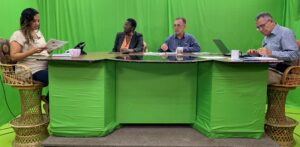The Creekcast E37: Ancestral Speaking ft. Hilario & Daniel from Wikitongues
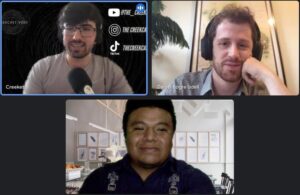 Dive in with Wikitongues an organization that works towards revitalizing and restoring languages that could be near extinction, and today we talk with Hilario Poot Cahun the representative of Mayan Yucatec & Daniel the founder of Wikitounges.
Dive in with Wikitongues an organization that works towards revitalizing and restoring languages that could be near extinction, and today we talk with Hilario Poot Cahun the representative of Mayan Yucatec & Daniel the founder of Wikitounges.
Revitalizing the Yucatec Mayan Language in José María Morelos, Quintana Roo, México
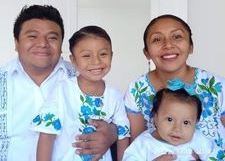 Our Maya brother Hilario Poot Cahun just received a little funding from Wikitongues to help move the Maya project forward. They wrote a nice article about him: Revitalizing the Yucatec Mayan Language in José María Morelos, Quintana Roo, México. Additionally, Hilario is on the Marine Conservation without Borders Board of Directors and the President of the Sayab Miats AC, a Maya culture and education organization in Quintana Roo, MX. Hilario is shown here with his wife Liliana and his daughters Yatsil and Yaabilaj.
Our Maya brother Hilario Poot Cahun just received a little funding from Wikitongues to help move the Maya project forward. They wrote a nice article about him: Revitalizing the Yucatec Mayan Language in José María Morelos, Quintana Roo, México. Additionally, Hilario is on the Marine Conservation without Borders Board of Directors and the President of the Sayab Miats AC, a Maya culture and education organization in Quintana Roo, MX. Hilario is shown here with his wife Liliana and his daughters Yatsil and Yaabilaj.
Shaetlan Scots word game’s success leads to international partnerships
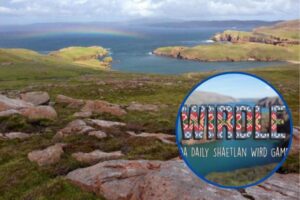 Professor Viveka Velupillai, a Shetland-based language expert affiliated with the University of Giessen in Germany, told The National that the partnerships did not stop there. She said that they had also teamed up with Marine Conservation without Borders, a project that seeks to further both scientific literacy and biocultural diversity through bilingual education.
Professor Viveka Velupillai, a Shetland-based language expert affiliated with the University of Giessen in Germany, told The National that the partnerships did not stop there. She said that they had also teamed up with Marine Conservation without Borders, a project that seeks to further both scientific literacy and biocultural diversity through bilingual education.
Pointing to “numerous indigenous groups who have, for countless generations, known how to live with their environments”, Velupillai said: “It is from them that we need to harness this knowledge, and to bring back focus on pride of place.
The professor said that the work with Marine Conservation without Borders would aim to produce “bilingual educational material that is both universal and localized”. Click on the Scott’s periodical The National to view the full article.
Biocultural Education Project to Safeguard Indigenous Language and Culture to be Developed
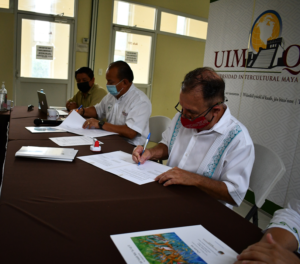 Our man with the suitcase is on the road again! Our Director Robby Thigpen recently traveled to José María Morelos, Quintana Roo to visit his Maya suku’un Hilario Poot Cahun. They met with faculty of the Universidad Intercultural Maya de QRoo and discussed plans to test and validate the Marine Conservation without Borders biocultural curriculum in schools in Maya communities in QRoo.
Our man with the suitcase is on the road again! Our Director Robby Thigpen recently traveled to José María Morelos, Quintana Roo to visit his Maya suku’un Hilario Poot Cahun. They met with faculty of the Universidad Intercultural Maya de QRoo and discussed plans to test and validate the Marine Conservation without Borders biocultural curriculum in schools in Maya communities in QRoo.
Biocultural curricula are biology curriculum that recognizes the importance of Indigenous ecological knowledge systems and are indistinguishable from modern biology curricula to biologists and educators. These biocultural curricula have multiple secondary benefits such as language documentation, teaching mother tongue reading comprehension and writing skills and can be used for linguistic and cultural revitalization to name a few.
The project titled M úul tuukul yo ‘ osal u kanil bak ‘ pachil ichil maaya kajtalilo ‘ob aims to safeguard human rights, including equality and the right of access to a science education and provide new opportunities for younger generations to stay in contact with and safeguard their culture and language. ~UIMQROO
Innovative Science Communication and Biocultural STEM Education are Paramount to Closing the Circle
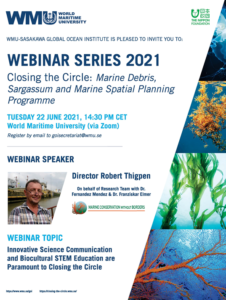 The World Maritime University Webinar Series Closing the Circle: Marine Debris, Sargassum and Marine Spatial Planning Programme 2021 presents Innovative Science Communication and Biocultural STEM Education are Paramount to Closing the Circle (ACCESS CODE: zRQD*?8*) with Robby Thigpen, Franziska Elmer PhD, Mar Fernández-Méndez PhD, Catherine Guinovart & Hilario Poot Cahun.
The World Maritime University Webinar Series Closing the Circle: Marine Debris, Sargassum and Marine Spatial Planning Programme 2021 presents Innovative Science Communication and Biocultural STEM Education are Paramount to Closing the Circle (ACCESS CODE: zRQD*?8*) with Robby Thigpen, Franziska Elmer PhD, Mar Fernández-Méndez PhD, Catherine Guinovart & Hilario Poot Cahun.
Robby Thigpen is the Executive Director of Marine Conservation without Borders and one of the hosts for the Sargassum Podcast, a platform for disseminating sargassum related information to all affected stakeholders. Thigpen has been living with Indigenous peoples since 1996. He came to the Caribbean in 2004 to use stable isotope analysis to elucidate food webs of the Indigenous lobster fishery of Belize. Lately, he has been developing methods to seamlessly combine Indigenous ecological knowledge systems with Western science to create biocultural curriculum, a novel STEM curriculum for the linguistically diverse education systems of the greater Caribbean basin and beyond. His mangrove ecosystems prototype has been ethnotranslated into about a dozen language combinations from the Caribbean basin. Thigpen is also developing biocultural curricula with linguistic and cultural communities from Oceana, Indonesia, SE Asia, and East Africa because everyone should have access to science books in their home language.
Global Coral Reef Week 2020
Robby Thigpen is co-founder and Executive Director of Marine Conservation without Borders (MCB), whose mission is promoting culturally relevant conservation science among coastal and marine communities. Robby’s immersion among Indigenous communities goes back to 1996 when he worked and lived among the Maasai. He would later study biology and anthropology at 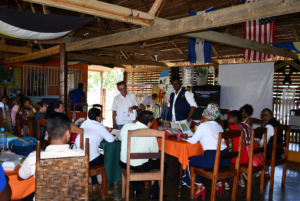 Appalachian State University, during which time his interests turned to the Indigenous lobster fisheries of the Mesoamerican Reef. Through
Appalachian State University, during which time his interests turned to the Indigenous lobster fisheries of the Mesoamerican Reef. Through ![]()
![]() his work with MCB, Robby has grown his network of ethnotranslators and conservation scientists throughout the Caribbean developing the organizations’ flagship project, Treasures of the Caribbean, a platform and template for bi-lingual conservation science education for learners in middle-school through university.
his work with MCB, Robby has grown his network of ethnotranslators and conservation scientists throughout the Caribbean developing the organizations’ flagship project, Treasures of the Caribbean, a platform and template for bi-lingual conservation science education for learners in middle-school through university.
MCB approaches conservation science by integrating Indigenous ecological knowledge systems with biology and conservation science to produce biocultural educational materials focused on marine species, ecology, and other topical content such as climate change and plastics in the environment. MCB and the Treasures project values and prioritizes relationships and respect among stakeholders sharing interest in local ecological and cultural communities. This foundation builds trust and understanding, making space for more effective communication of needs and ideas in promoting sustainable outcomes. By placing Indigenous ecological knowledge systems and languages alongside scientific knowledge and concepts we are growing scientific literacy among the communities we serve while showing how science may also be advanced when it is sensitive to and respectful of local languages, cultures and ecological knowledge systems.
GCRW 2020 plenary talk: Growing the knowledge continuum: bridging scientific knowledge and local ecological knowledge systems through bilingual conservation science education
Belize Love TV’s The Morning Show
Myrna Manzanares of the Belize National Kriol Council and our principal investigator Robby Thigpen join Love TV’s Ernesto Vasquez and & Tania Hulse on The Morning Show to discuss our bilingual conservation biology materials for Belize. The materials we have created for Belize include Maya (Yucatec), Kriol and Garifuna languages paired with English.
Langscape Magazine
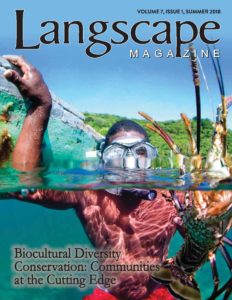 A New Approach to Bilingual Marine Conservation Science Education | The Collaborative work of Caribbean Communities and Marine Conservation without Borders by Thomas Dean King PhD “At MCB, we think there is a better way to develop curricula for linguistically diverse classrooms to make learning more accessible and, in the process, promote greater engagement and understanding among students and communities. First, MCB aims to make marine conservation science concepts accessible by developing books in local languages with relevant examples highlighting livelihoods and ecosystems with which students are familiar (landscapes, animals, fish, and plants). This approach provides a secondary benefit of promoting the goals of biocultural diversity. Putting local languages in school curricula contributes to language and cultural preservation and engages students by elevating their languages and traditional ecological knowledge (TEK) to an equal place with national languages of instruction (LOI) and associated knowledge of conservation science.” Click on the image to view the article.
A New Approach to Bilingual Marine Conservation Science Education | The Collaborative work of Caribbean Communities and Marine Conservation without Borders by Thomas Dean King PhD “At MCB, we think there is a better way to develop curricula for linguistically diverse classrooms to make learning more accessible and, in the process, promote greater engagement and understanding among students and communities. First, MCB aims to make marine conservation science concepts accessible by developing books in local languages with relevant examples highlighting livelihoods and ecosystems with which students are familiar (landscapes, animals, fish, and plants). This approach provides a secondary benefit of promoting the goals of biocultural diversity. Putting local languages in school curricula contributes to language and cultural preservation and engages students by elevating their languages and traditional ecological knowledge (TEK) to an equal place with national languages of instruction (LOI) and associated knowledge of conservation science.” Click on the image to view the article.
“Western concepts can be difficult. [What MCB is doing] is a better way; it takes our local knowledge and treats it like it is important.”—Hilario Poot Cahun, Universidad Intercultural Maya de Quintana Roo
American Scientist:
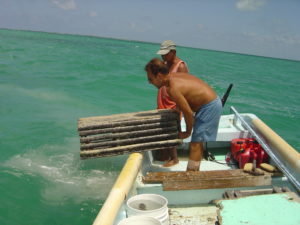 Sigma XI Grant Helps Support Lobster Study in Belize “Through hard work and a little help from a Sigma Xi Grant-in-Aid of Research, along with several other awards, Appalachian State University (ASU) applied anthropology major Robert C. Thigpen III made several trips to sunny Caye Caulker off the coast of Belize to study the lobster fishery of the western Caribbean. The streets of the four-mile-long island are made of sand, and most of the 1,200 permanent residents of Caye Caulker are more apt to travel by golf cart or bicycle than automobile. The island is popular with scuba divers, snorkelers, anglers and tourists, but commercial fishing is still an important source of revenue.”
Sigma XI Grant Helps Support Lobster Study in Belize “Through hard work and a little help from a Sigma Xi Grant-in-Aid of Research, along with several other awards, Appalachian State University (ASU) applied anthropology major Robert C. Thigpen III made several trips to sunny Caye Caulker off the coast of Belize to study the lobster fishery of the western Caribbean. The streets of the four-mile-long island are made of sand, and most of the 1,200 permanent residents of Caye Caulker are more apt to travel by golf cart or bicycle than automobile. The island is popular with scuba divers, snorkelers, anglers and tourists, but commercial fishing is still an important source of revenue.”
The San Pedro Sun:
“Appalachian State University anthropology major Robert Carson Thigpen III has spent nearly a year immersed in the culture of Caye Caulker, a small island off the coast of Belize that relies heavily on its fishing industry.
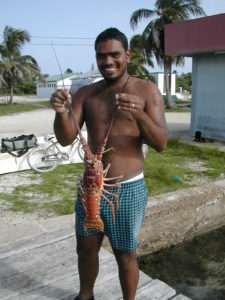 The oldest fishing co-operative on the island, the Northern Fisherman’s Co-operative Society Ltd. (NFCS), offered him an internship in January 2005. Through hard work and a little help from an international scholarship, Thigpen was able to stay in Belize for seven months to learn about the life of a lobster fisherman.
The oldest fishing co-operative on the island, the Northern Fisherman’s Co-operative Society Ltd. (NFCS), offered him an internship in January 2005. Through hard work and a little help from an international scholarship, Thigpen was able to stay in Belize for seven months to learn about the life of a lobster fisherman.
Thigpen’s experiences led to several research opportunities. After observing NFCS quality checks and noticing that many of the lobsters presented were gaining weight after they were caught, he decided to investigate further. Thigpen discovered that many fishermen saturate the tails of their catch in water before the quality checks begin causing the lobsters to be recorded as heavier than their true weight. As a result, many lobsters that are too young to have been able to reproduce are caught and passed off as weighing the legal limit.” Read more at the San Pedro Sun.
Open Your Eyes (Belize TV):

